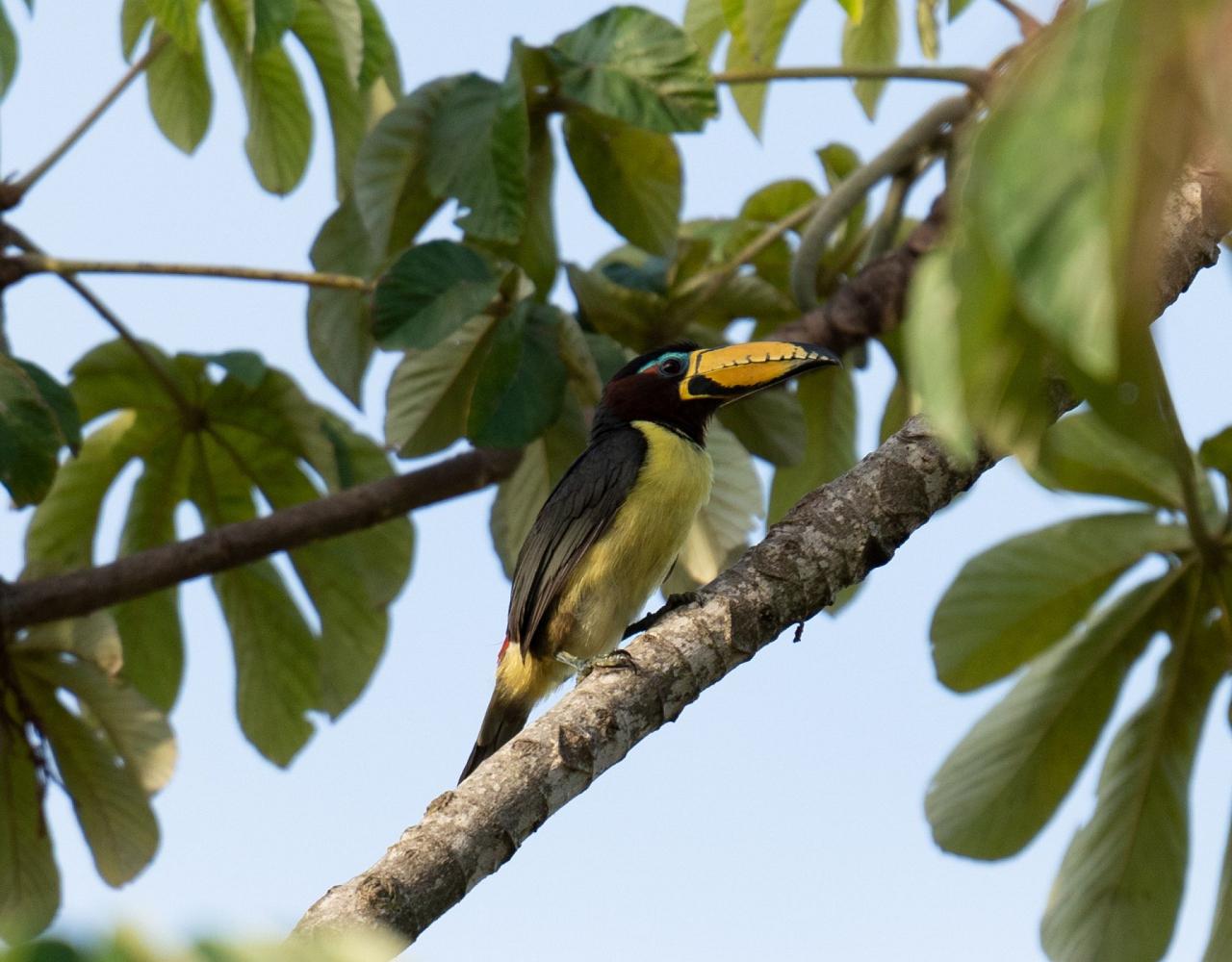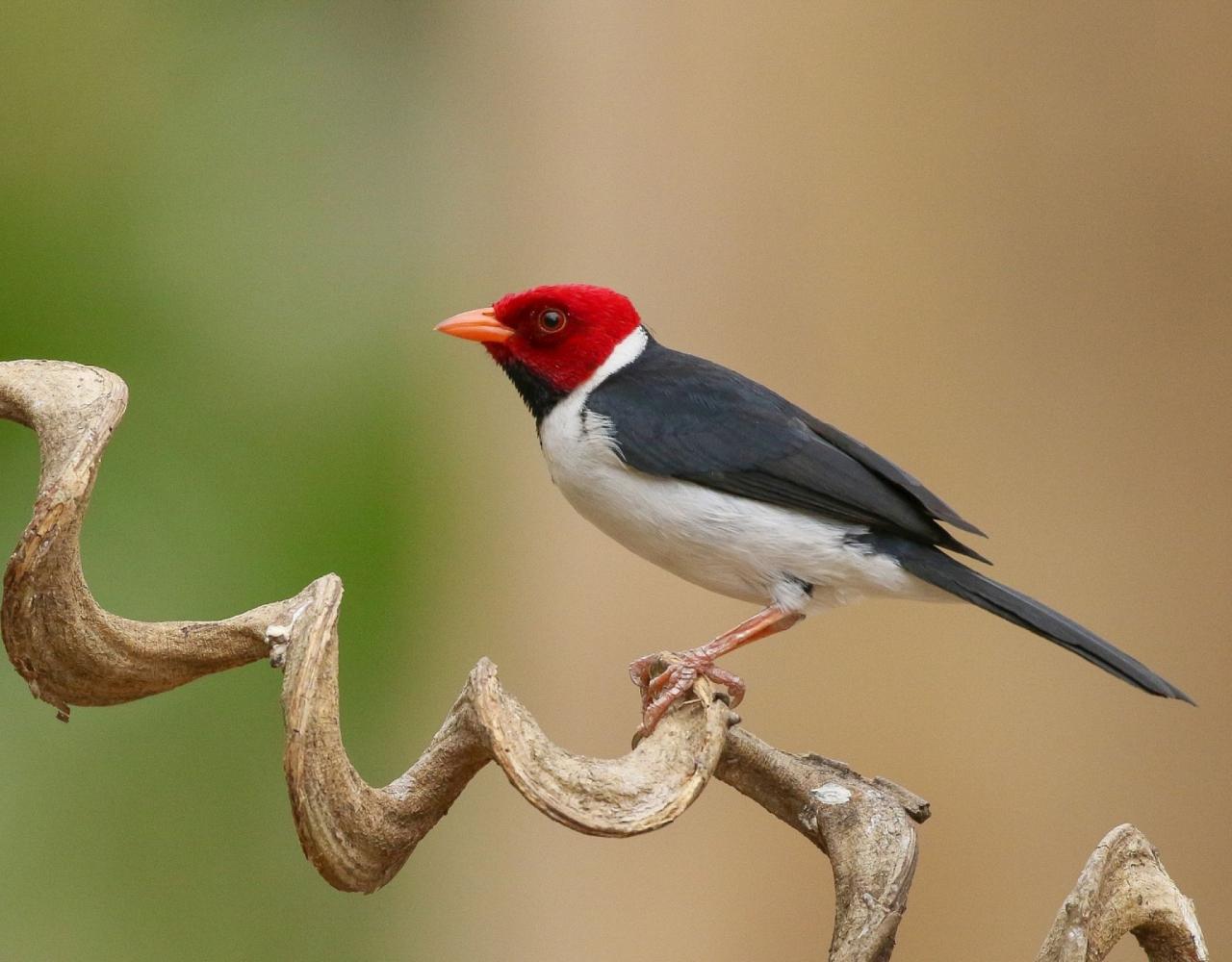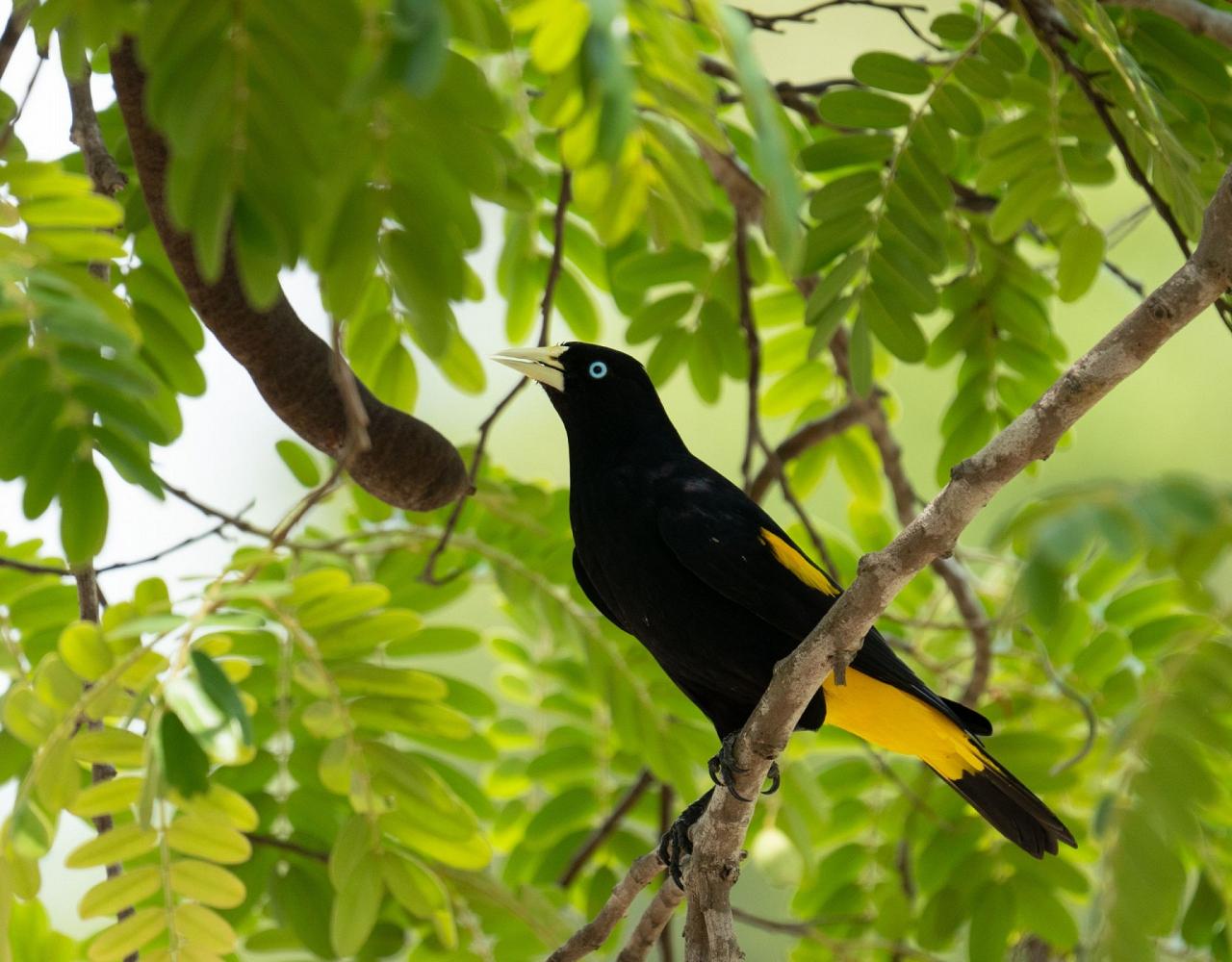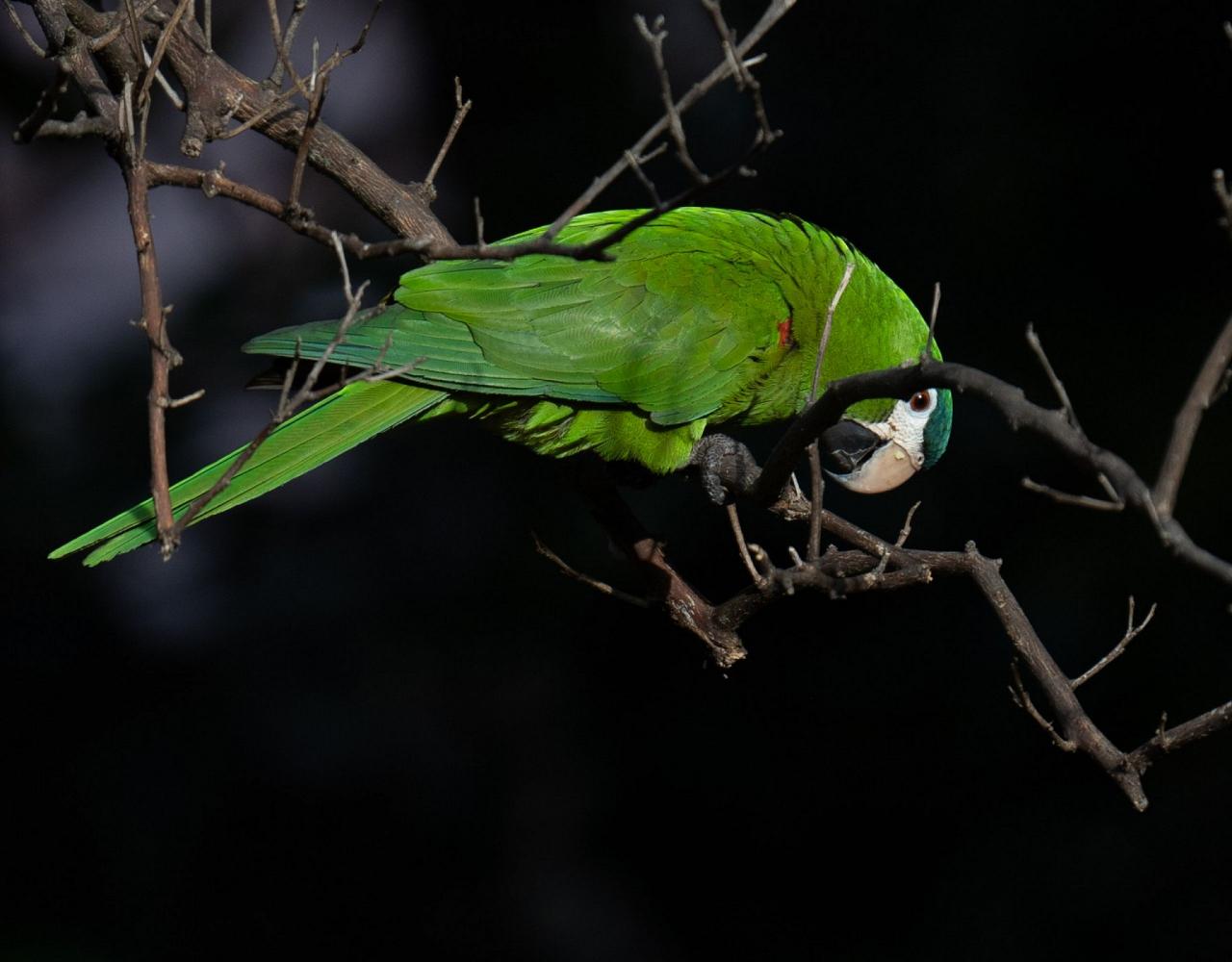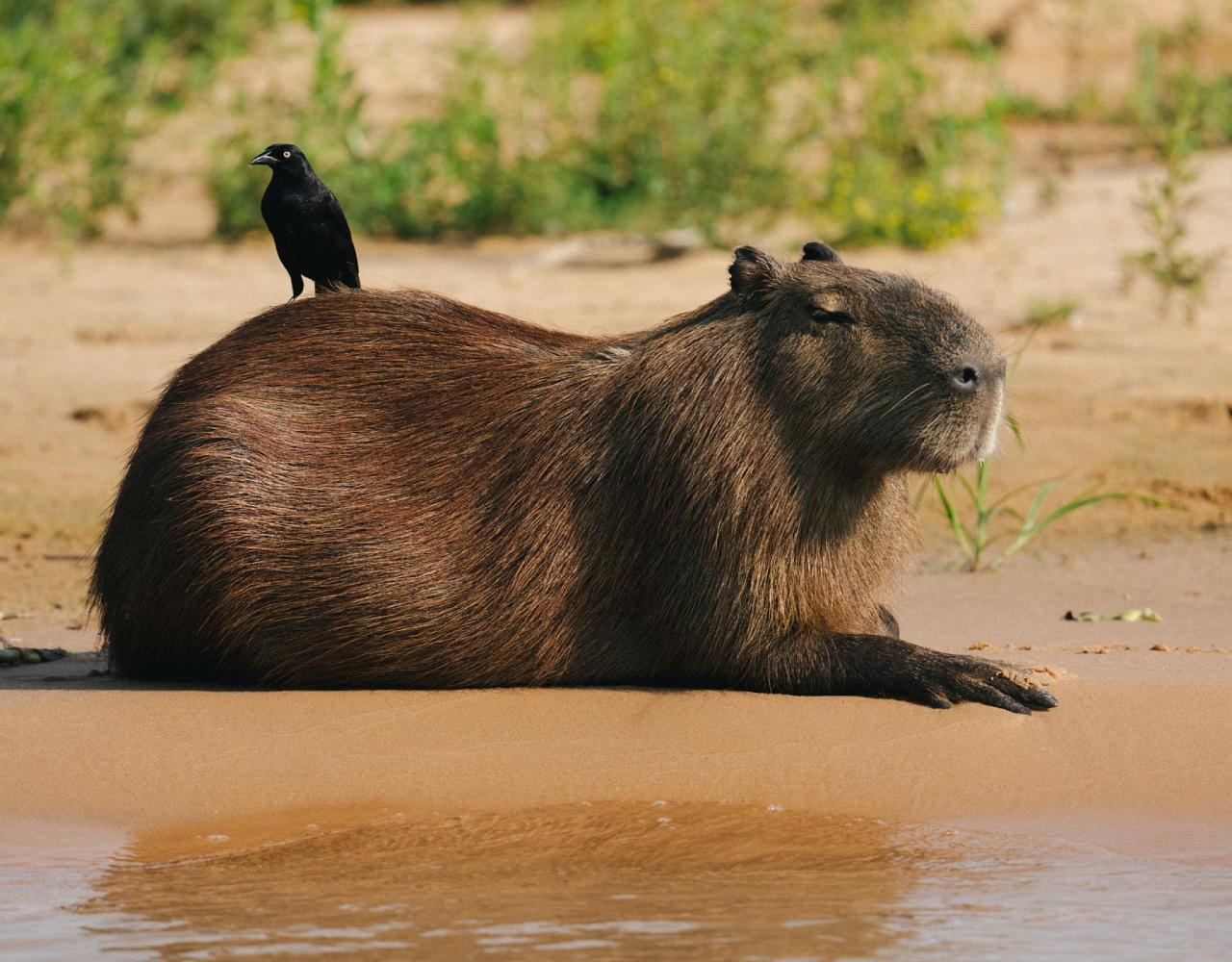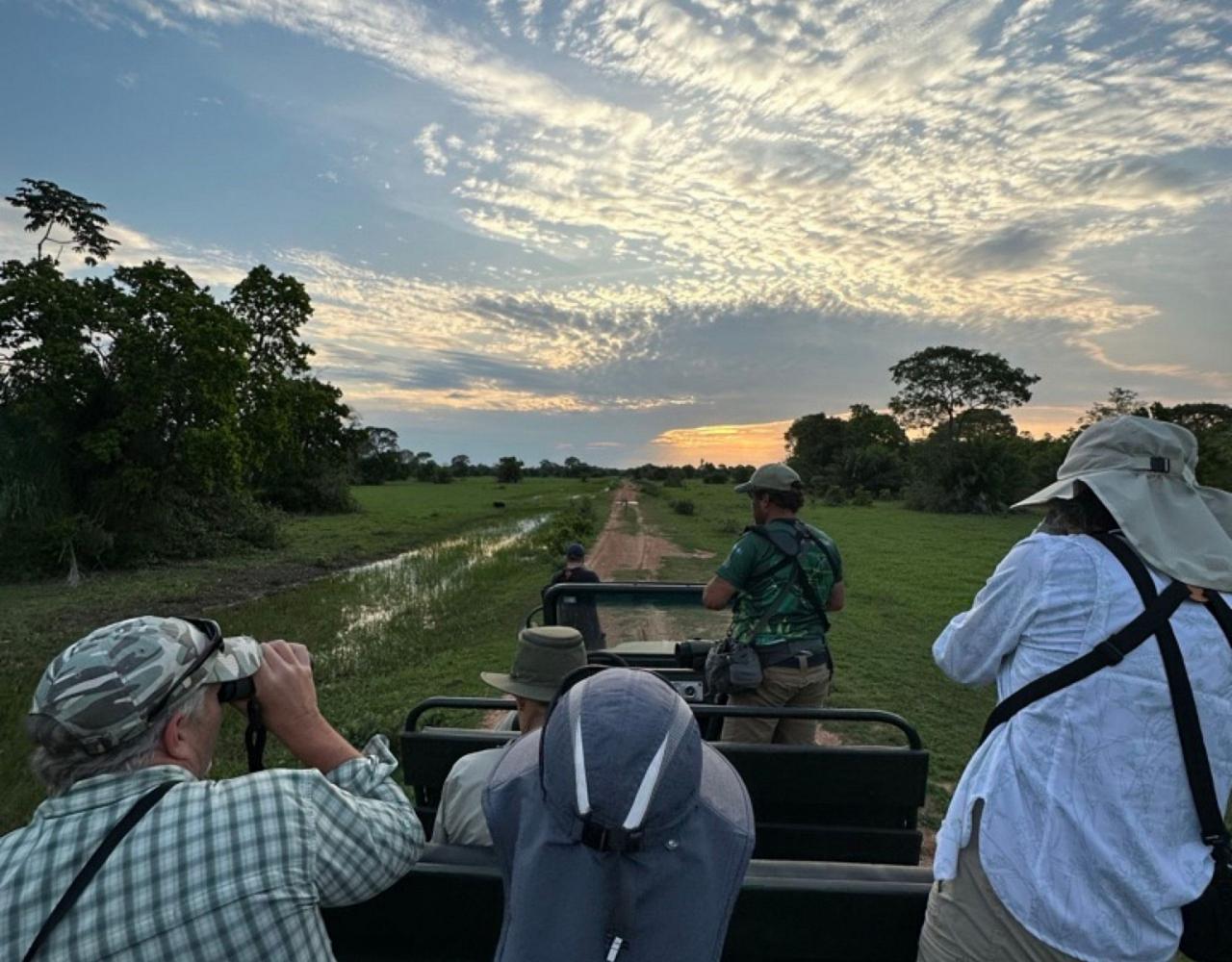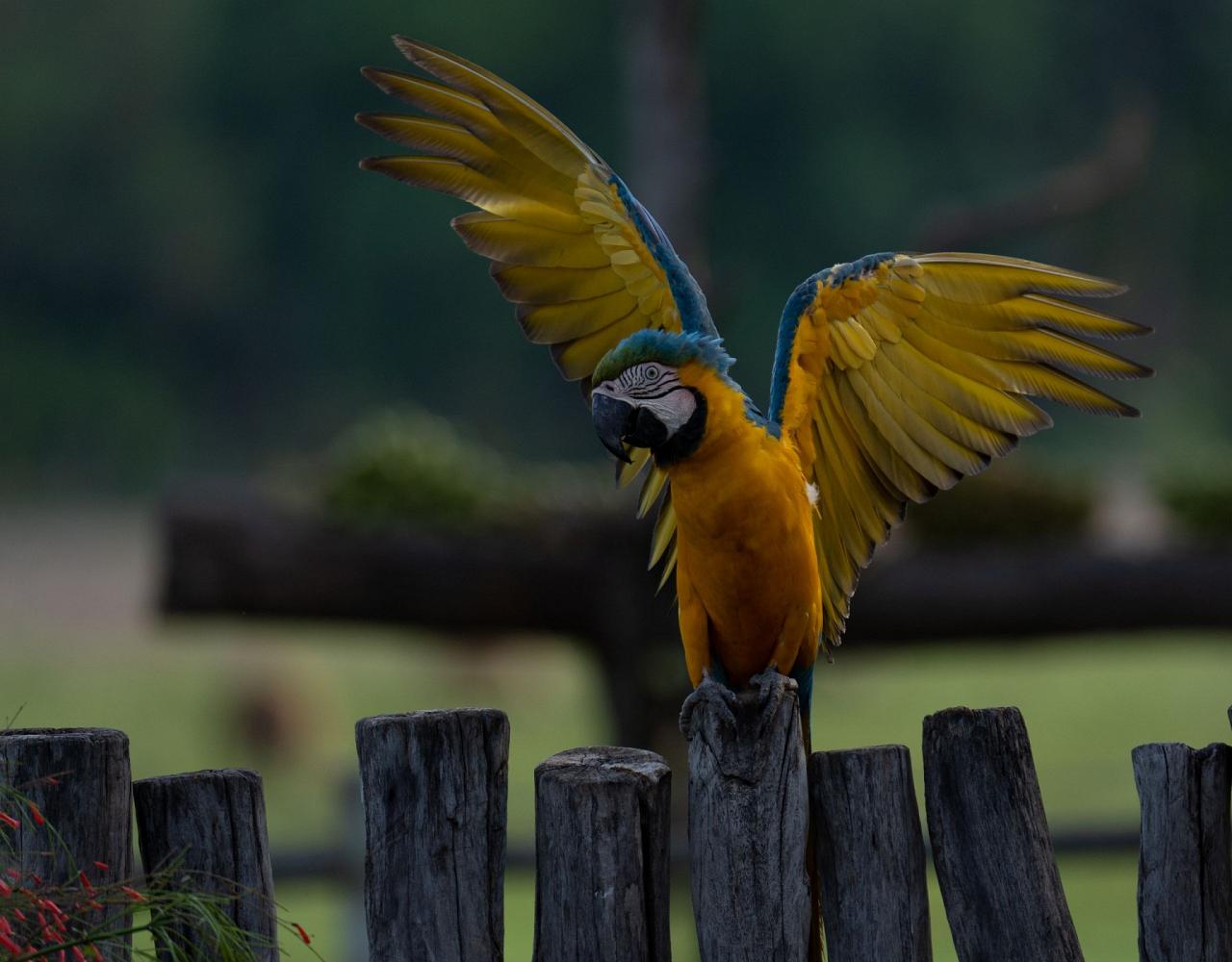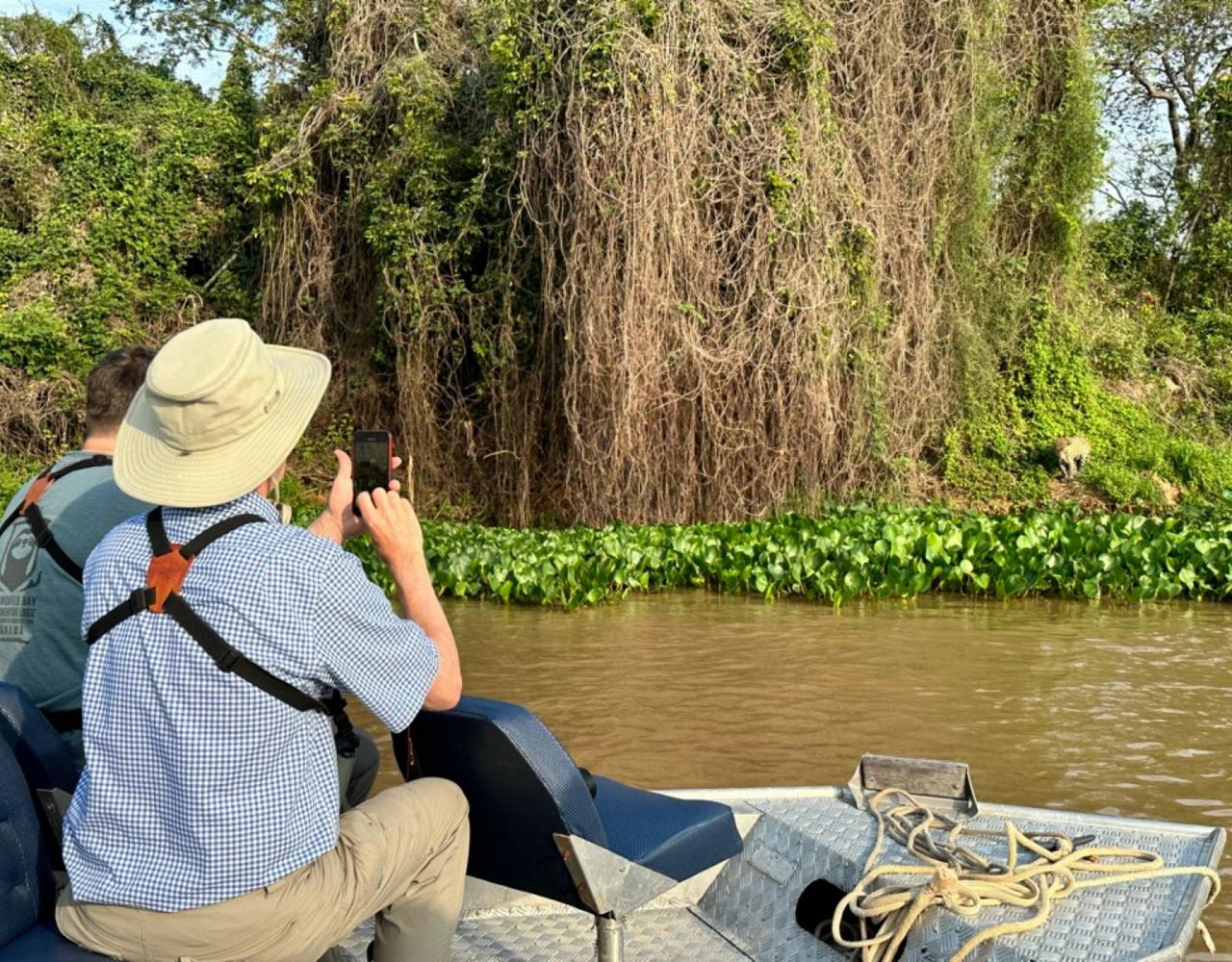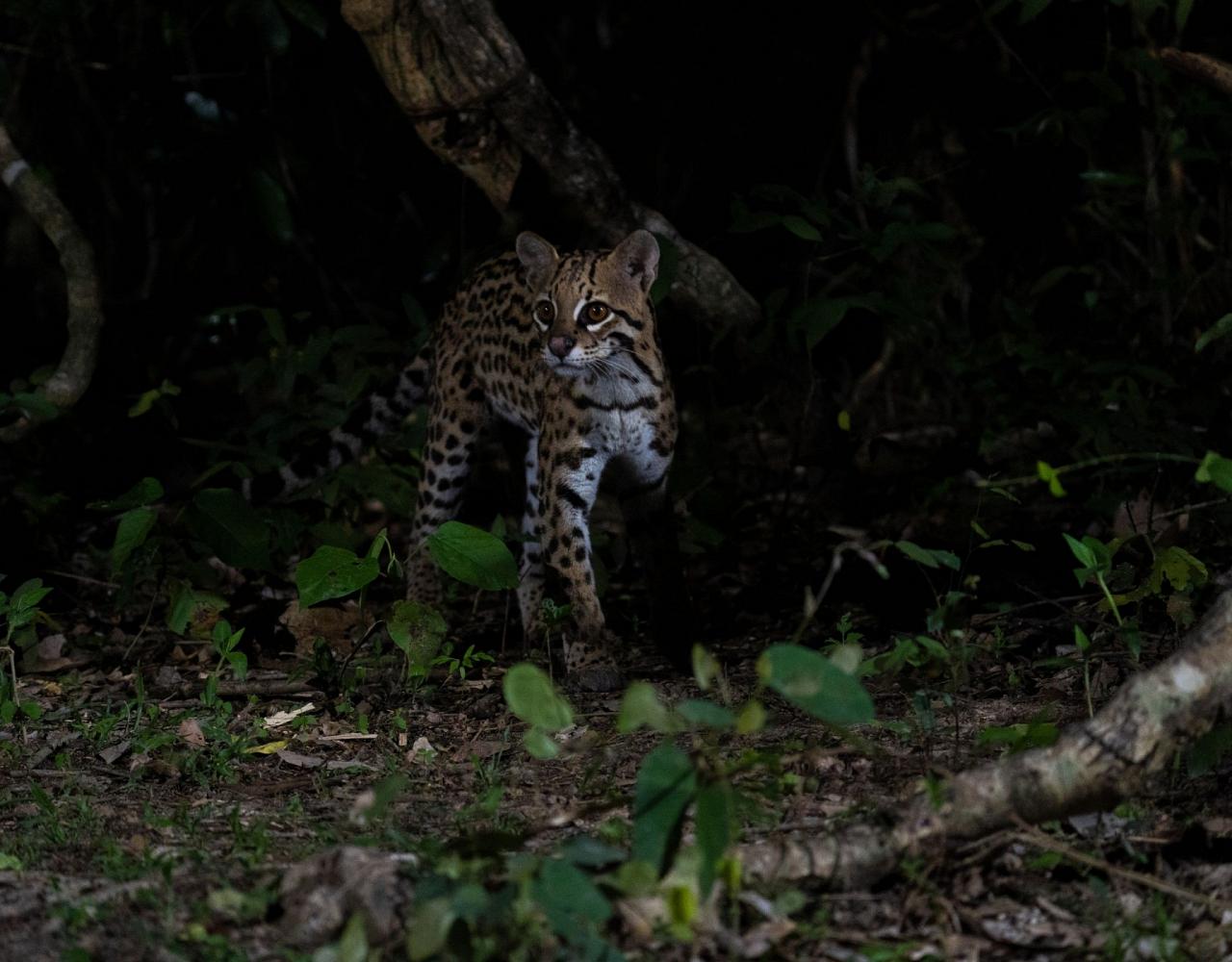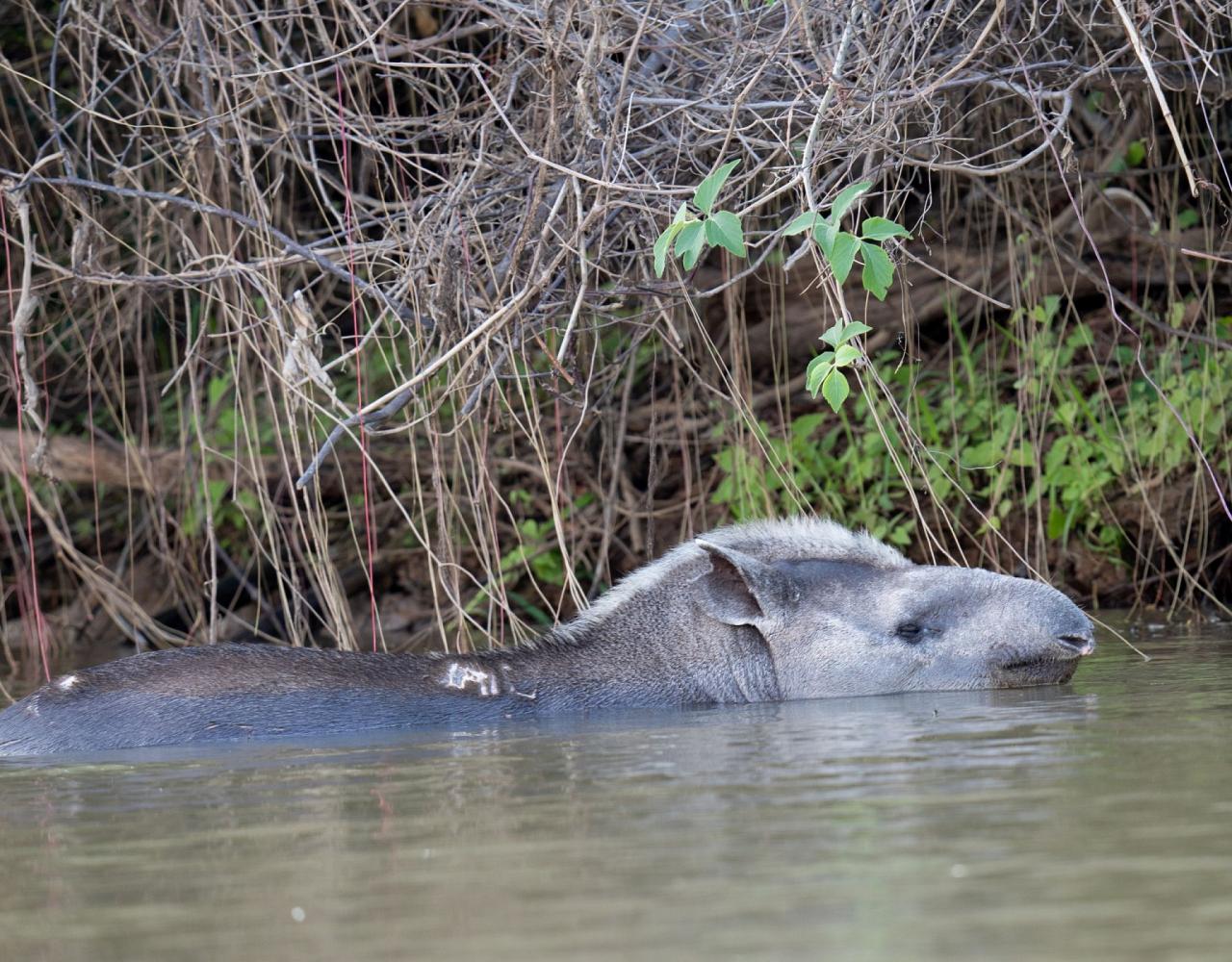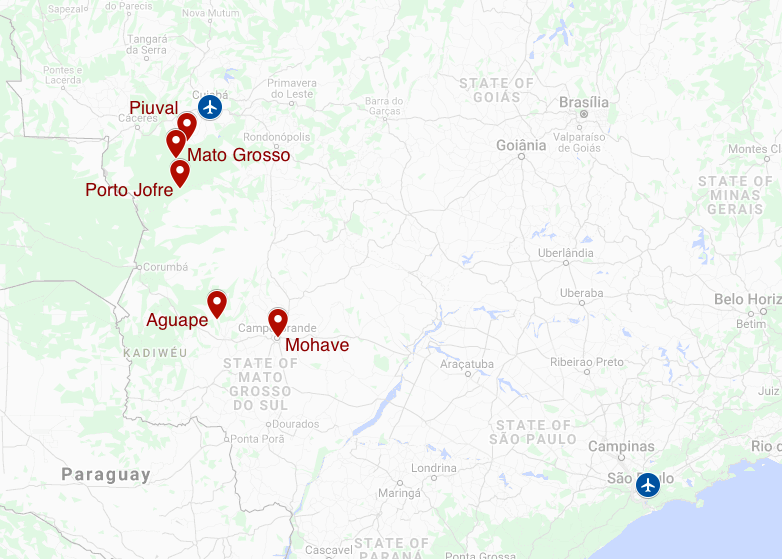- Overview
- Full Itinerary
- Extensions
- Photo Gallery
- Costing
- Travel Details
- Trip Reports
- Guide
- Map
- Know Before You Go
- Other Trips You May Like
Brazil’s Pantanal: A place of superlatives. Home to the world’s largest fresh-water wetlands, the Pantanal is ten-times the size of the Everglades, draining into a single channel: the Paraguay River. We venture deep into this world-class wildlife hotspot on a long road that bisects the Transpantaneira wilderness, in search of an adventure that can’t be missed.
In this famed region, we discover wildlife thriving in a mix of savanna, forest, and wetland habitats. Even a relaxed day can yield more than 100 species of birds and dozens of mammals — Capybara are everywhere!
Brazilian Tapir, Capybara, Giant Anteater, Giant Otter, and yes, Jaguar (we saw seven on our 2017 trip!), are five of many incredible mammals we seek, while Greater Rhea, Hyacinth Macaw, Toco Toucan, and Helmeted Manakin top the list of impressive bird sightings. Rare Yellow Anaconda, one of the world’s largest snakes, may be a lucky find, while the small crocodilian Yacaré can be seen by the thousands. For many, it is the sheer number and variety of species that leaves the most lasting impression.
Charming (and working) cattle ranches serve as our accommodations, each with its own impressive and distinctive wildlife community. Lazy afternoons invite photographers to wander between shade circles of the ranch trees for rare time with Hyacinth Macaw and other species. Don’t miss the post-tour extension to the Jardim da Amazônia located on the banks of the Rio Claro, where the Cerrado meets the Amazon Rainforest.


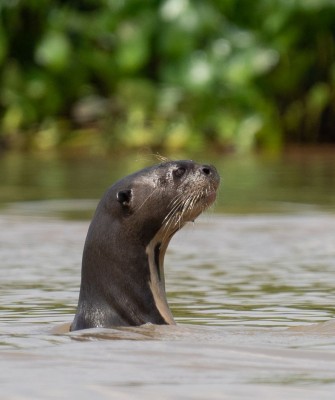

- “AWESOME, FANTASTIC. A trip of a lifetime! (Guides) Wes and Marco were as good as it gets.” — Charles Henderson, 2023 Traveler
- “I’ve already told family and friends that it may have been the very best trip I’ve ever taken. Oh, the jaguars! Watching three different ones for extended periods of time surpassed my expectations. And I got such wonderful photos and videos.” — Laura Jelemensky, 2023 Traveler
- “Excellent opportunity to view Brazil's southern (Panatal) wildlife. Remarkable birding…for me the most new species ever on a trip. Four different jaguars in three different locations; loved the Giant Anteaters…We were fortunate to see 20 within a two-day period; and Giant River Otters!” — Joyce Kelly, 2023 Traveler
- “Great opportunity to see lots of iconic wildlife up close…Capybaras were the reason I went to the Pantanal. Great to see other mammals like Giant Anteater too.” — Andrew Kimmel, 2023 Traveler
- “Amazing! Like a safari in the Land Before Time.” — Heather Warm, 2023 Traveler
- “If you want to see the birds and wildlife of the Atlantic forest and the interior of Brazil take this trip! It is a bit rugged and you are constantly on the move to see more species but it is well worth the effort. We saw over 300 species of birds, from flightless Greater Rhea, many colorful Macaws including the largest, Blue Hyacinth, my favorite Southern Lapwing, and little Eared Pygmy Tyrant, Piculets, and Pygmy Kingfisher. The greatest excitements were given the Giant Anteaters, the river bank Jaguars, and our one night roaming Cougar.” — James Cheevers 2023 Traveler
- “Amazing, exhausting, and exotic. As an amateur photographer the Pantanal was a wonderful location to see birds and wildlife out in the open, not too afraid of humans. Field trips were great as were the guides. I loved all the boat trips. Wes Larson was the American guide and was very patient and kind. He was organized and made sure everything ran as smoothly as possible. Benedetto was the Brazilian guide and was knowledgeable about birds and his English was excellent.” — Deborah Ellinger, 2023 Traveler
- “We saw many beautiful birds, great views of jaguars hunting along shorelines, a diversity of other mammals such as anteaters, armadillos, capybaras, deer, giant otters, peccaries, and monkeys, and, of course, plenty of caimans. The trip was well-guided, the accommodations were comfortable, the staff at the posadas and other places were friendly, and the drivers and boatmen were friendly.” — Gayle Garman, 2023 Traveler
Tour Highlights
- Watch for South America’s “Big Five” of mammals: Jaguar, Giant Anteater, Giant Otter, Brazilian Tapir, and Capybara
- Scout for the “Big Five” of birds: Harpy Eagle, Greater Rhea, Hyacinth Macaw, Toco Toucan, and Helmeted Manakin. Add Southern Screamer, Sunbittern, Scarlet-headed Blackbird, and so many more!
- Experience the Transpantaneira wilderness road on safari-like excursions
- Look for five species of kingfisher
- Enjoy delicious local cuisine and exceptional hospitality at fazendas (working cattle ranches) at several stages along the road
- Cruise the Cuiabá River for our best chance at a Jaguar sighting
- See water birds in mass congregation — like those of the Everglades, but magnified!
- Watch for at least four species of monkeys and several hundred species of birds
- Discover night birds under intense southern sky constellations
- Stay on for the post-tour extension to birder's paradise Jardim da Amazônia, home to at least 560 species of bird and over 30 mammal species

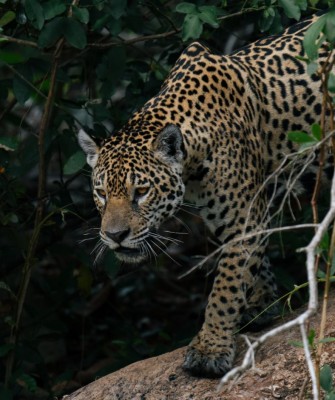
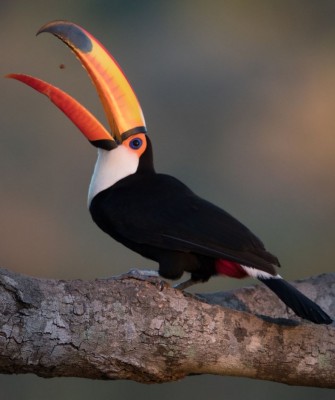
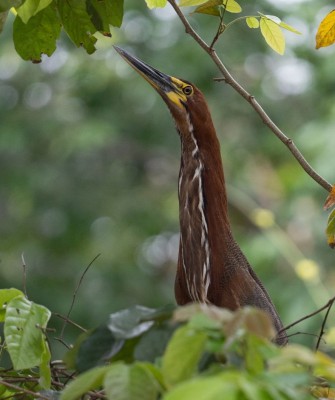
Trip Itinerary
Itineraries are guidelines; variations in itinerary may occur to account for weather, road conditions, closures, etc. and to maximize your experience.
Fri., Sep. 5 Arrival in Campo Grande
Arrive today in Campo Grande, Brazil. We start our tour with a welcome dinner where we meet your guides and fellow travelers. We invite you to sample Brazil's national cocktail, the caipirinha, made with cachaça (sugarcane liquor), sugar, and lime. We predict this may be the first of many.
Accommodations at the Hotel DeVille (D)
Sat., Sep. 6 Explore the South Side of the Pantanal
We work our way through the south side of the Pantanal today en route to our lodge. This is a wildlife watching transfer with plenty of stops for mammals and birding on the way. We are motivated to get there, since this is where we have lunch!
After checking into our rooms, we spend time birding around the lodge until the end of the day, looking for birds like the Chaco Chachalaca, Hyacinth Macaw, Blue-fronted Parrot, Nanday Parakeet, Toco Toucan, Lineated and White Woodpeckers, Narrow-Billed Woodcreeper, Greater Thornbird, Giant Cowbird, Crested Oropendola, Purplish and Plush-crested Jays, Red-crested Cardinal, and many others.
We then gather with friends for dinner and for those that wish, the daily checklist.
Accommodations at Aguapé Lodge or similar (B,L,D)
Sun., Sep. 7 Pantanal Safari
Our lodge is an excellent environment for birdwatching, a place where over 300 bird species have been recorded. The lodge is located 195 kilometers from Campo Grande city, which has an international airport, and 60 kilometers from Aquidauana city, which is known as the gateway to the Pantanal. We have a full day today to explore from the lodge.
Interesting bird species are Southern Screamer, Blaze winged Parakeet, Gilded Hummingbird, Toco Toucan, Pale crested and White fronted Woodpecker, Red billed Scythebill, Helmeted Manakin, and the Scarlet headed Blackbird.
After an early breakfast, we embark on a safari drive with good chances to see the Undulated Tinamou, Capped Heron, Jabiru, Savanna Hawk, Rufescent Tiger Heron, Buff-necked and Plumbeous Ibis, Roseate Spoonbill, Hyacinth and Yellow-collared Macaw, Red-billed Scythebill, Orange-backed Troupial, and many others.
After lunch we are back at the lodge and make time to enjoy a siesta in the hot part of the day, and then we make another safari drive until the end of the day, returning in the dark with chances to see mammals like the Crab-eating Fox, South American Coati, Capybara, Marsh Deer, Southern Tamandua, Crab-eating Raccoon, River Otter, and night birds such as Common and Great Potoo, Spectacled and Striped Owl, Pauraque and Scissor-tailed Nightjar.
We find this area to be the best place to spot Giant Anteater in the whole region and we make the effort to find them, so keep your fingers crossed! We have dinner upon return, and for those that wish again, the checklist.
Accommodations at Aguapé Lodge or similar (B,L,D)
Mon., Sep. 8 Birding from Aguapé to Campo Grande
After an early breakfast we take a bird walk for excellent chances to see Great Rufous Woodcreeper, Blaze-winged Parakeet, Black-crowned Tityra, Chestnut-eared Aracari, and Ferruginous Pygmy-Owl, and many more.
This morning we may also enjoy a motorboat excursion at Aquidauana River. This river is full of life with good chances to see a family of Giant River Otter and special birds like Black-collared Hawk, five species of kingfisher, Rufous-tailed Jacamar, Blue-throated Piping Guan, and many others.
After an early lunch at the lodge we drive back to Campo Grande, check in to the hotel, and then enjoy a short visit to the “nesterar,” a place where a nice concentration of macaws and herons nest near the city.
Accommodations at Hotel DeVille (B,L,D)
Tues., Sep. 9 Campo Grande to Cuiaba | Northern Transpantaneira Adventure Begins
After an early domestic flight to Cuiabá we begin the second (northern) half of our Pantanal adventure!
Driving south, we reach the famed Pantanal via a paved road to Poconé. En route we have lunch in a typical churrasqueria, and enjoy simple Brazilian-style cuisine. From here, we travel the dirt Transpantaneira Road, perhaps only rivaled by Tanzania’s Serengeti road for spotting wildlife. Along the way to our lodge, we might see Ringed Kingfisher, Red-crested Cardinal, Lesser Yellow-headed Vulture, Toco Toucan, Jabiru, Limpkin, our Capybaras (of course!), Yacaré Caiman, and more.
After check in, we can stretch our legs on a short walk. There is a lovely pool if anyone wants to cool off with a swim.
Accommodations at Rio Claro Lodge or similar (B,L,D)
Wed., Sep. 10 Birding & Wildlife Spotting on the Transpantaneira
After some morning wildlife viewing at the ranch, we depart down the Transpantaneira, keeping an eye out for Red Brocket Deer, Marsh Deer, Crab-eating Fox, Greater Rhea, Chestnut-bellied Guan, Bare-faced Curassow, and a mix of wading birds. Bridges are hotspots from which we can view the presence of a huge food supply; Green Kingfisher, Great Egret, Cocoi Heron, both Bare-faced and Green Ibises, and White-lored Spinetail are just a few species we may see.
We pass through scattered palm woodlands, cerrado scrub, and seasonally-flooded grasslands reminiscent of the Everglades. Roadside ponds and canals are filled with waders: Roseate Spoonbill, Plumbeous Ibis, Limpkin, cormorants, herons, kingfishers, and their predator, Yacaré Caiman. August water conditions concentrate the fish for foraging waders like Jabiru and Maguari Stork.
Accommodations at Rio Claro Lodge or similar (B,L,D)
Thurs., Sep. 11 Birding & Wildlife Spotting on the Transpantaneira | Drive to Porto Jofre | Jaguar Boat Excursion
We spend a bit more time exploring around our lodge before we head off to Porto Joffe, the “end of the road.” Palms attract several resident pairs of Hyacinth Macaw. From this little town on the Cuiabá River, we board a small boat to reach our lodgings—two days on a lovely houseboat. Rooms are air-conditioned, with private bath. This “floating hotel” allows us to stay close to where the wildlife has been spotted; we explore from the houseboat each day on smaller boats.
We check into our boat cabins, have dinner, then have a briefing on safety and wildlife we hope to see. If skies are clear, star viewing is impressive—you can see the Southern Cross!
Accommodations in private cabins on a floating houseboat hotel! (B,L,D)
Fri., Sep. 12 Full Day Looking for Jaguar, Jabiru & More | Jaguar Boat Excursion
Awake on the river to a host of sounds and the sight of macaws and more flying overhead. We use smaller speedboats to spend the day searching for the iconic Jaguar, known for their affinity to water. They are good swimmers, and often lay down along the shore after a swim. Chances are good that we see at least one individual, male or female?perhaps even together!
We lunch on board, take a short siesta (yes, love that AC … ) and try for Jaguar again in the afternoon. Wildlife is plentiful in this remote part of the Pantanal, so once we accomplish the main task (a Jaguar, of course) we have time to admire other species like Giant Otter, Black Skimmer, Pied Plover, Southern Screamer, and Yacaré Caiman. We also visit little streams for skulkers like Pygmy Kingfisher and Sungrebe.
By late afternoon we return to the boat. We celebrate our sightings with caipirinhas before dinner!
Accommodations in private cabins on a floating houseboat hotel! (B,L,D)
Sat., Sep. 13 Wildlife & Birding on the Lower Transpantaneira
After two days immersed in the wildest part of the Pantanal, we return north, retracing our route. We are not in a hurry though, and work some of the areas we previously traveled in more detail.
Perhaps we find a troop of Black-and-Gold Howler Monkey, Chestnut-eared Aracari, Snail Kite, Rusty-backed Antwren, Common Tody Flycatcher, White-browed Blackbird, and others species as we drive to our next lodge. We watch for Cream-colored Woodpecker, Ashy-headed Greenlet, Short-crested Flycatcher, Mato Grosso Antbird, Great Antshrike, and Purple-throated Euphonia. Near water we find Whistling and Capped Herons, Pygmy and Ringed Kingfishers, Sunbittern, Black-collared and Great Black Hawks, and Rusty-backed Spinetail.
Once we arrive at the hotel on the Rio Pixium, we settle in and check the feeders for brilliant-colored troupials, Palm, Silver, and Sayaca Tanagers, and Red-crested Cardinal. At this point in our journey we have seen numerous mammals and birds, and we can base our efforts on finding anything missing from our list.
Accommodations at South Wild or similar (B,L,D)
Sun., Sep. 14 Pixaim River Area Wildlife & Birding
It’s another morning for gazing at the sunrise while sipping good Brazilian coffee. This morning, pending what we still need to see, we can do a safari drive, or we can take a small boat ride on the Pixaim River to spot secretive species like Agami and Zig-Zag Herons. This is a good spot for Giant Otter and, with luck, a Tapir.
Driving back to Cuiabá, the landscapes are iconic and make for great pictures. We look for Black-capped Donacobious, Green-and-rufous Kingfisher, Little Blue Heron, and other species like some very impressive iguanas. We can break up our drive with a walk in Gallery Forest habitat looking for special birds like Helmeted Manakin, Mato Grosso Antbird, Band-tailed Antbird, Black-hooded Tanager, Blue-crowned Trogon, and more.
Dinner finds us sampling authentic Grosso cuisine, including legendary piranha and local beef.
Accommodations at South Wild or similar (B,L,D)
Mon., Sep. 15 Wildlife Viewing | Return Drive to Cuiabá | Departures
Today, we make our way back to Cuiabá; the paved road is perhaps a welcome sight as we bid adieu to the marvelous but often dusty Pantanal. Our plan is to arrive in Cuiabá in time for connections to São Paolo for evening flights out. For those not finding a good flight match up, you can return to GRU and overnight, or simply overnight in Cuiabá at the Odara Hotel, close to the city’s botanic gardens, and start fresh the following day. If you plan to overnight in Cuiabá and would like to add an outing at a local park, we are happy to offer that (added charge). (B,L)
Amazonia Post-Tour Extension
Itineraries are guidelines; variations in itinerary may occur to account for weather, road conditions, closures, etc. and to maximize your experience.
Mon., Sept. 15: Transfer to Jardim da Amazônia
Ranked among the best birdwatching destinations in Brazil, the Jardim da Amazônia is located on the banks of the Rio Claro, where the Cerrado meets the Amazon Rainforest. At least 560 species of birds have been recorded here along with over 30 mammal species. Located north of Cuiaba, the Jardim da Amazônia is approximately three and a half hours by vehicle.
We depart Cuiaba in the afternoon and bird our way to Jardim da Amazônia. Due to the location of the lodge in the ecotone between the Cerrado and Amazon, the trees are shorter making it easier to see canopy species as well as a wide variety of Amazonian specialties. We keep our eyes peeled for Spotted Puffbird, Rufous-capped Nunlet, Pink-throated Becard, Tooth-billed Wren, Slaty-capped Shrike Vireo, and Cryptic Forest-Falcon.
Accommodations at Jardim da Amazônia (D)
Tues., Sept. 16 - Wed., Sept. 17: Jardim da Amazônia
We wake up early for morning birding outings on the lodge grounds. Several trails lead to different habitats that we explore. Walking through the forest, we may encounter Black-girdled Barbet, the unique Dot-eared Coquette, Black-bellied Thorntail, Spotted Puffbird, Gould’s Toucanet, Cream-colored Woodpecker, Lettered Aracari, Snow-capped and Fiery-capped Manakin, and colorful Tanagers such as Blue-necked, Dotted, Swallow, and Turquoise. Black-faced Spider Monkeys, Crab-eating Fox, Coati, and Tapir are some of the mammals that can be seen.??
We enjoy deliciously prepared lunches at the lodge with time to relax and perhaps enjoy a dip in the spring-fed natural swimming pool. Afternoon activities include more time to explore the trails on the lodge grounds. We also take a boat cruise on the lake of clear water with white sandy beaches. Cone-billed Tanagers, although rare, can be seen as they prefer the open forested areas along the lake edge. First discovered in this area in 2008, this is the main known area for the species. Other species include Zigzag Heron, Striated Heron, Crested Eagle, Neotropic Cormorant, and Bare-faced Ibis.??
Fabulous chef-prepared dinners are served at the lodge as we enjoy sunset. One evening we take a night safari to look for Amazonian Pygmy-Owl, Ferruginous Pygmy-Owl, Spectacled Owl, and other night birds.
Accommodations at Jardim da Amazônia (B,L,D)
Thurs., Sept. 18: Transfer to Cuiaba
We’ll start the morning birding the grounds of Jardim da Amazônia, enjoying our last moments surrounded by the vibrant birdlife of this incredible region. We’ll then journey back to Cuiabá, taking time to bird along the way, where we’ll gather for a farewell dinner to reflect on our Amazonian adventure and the unforgettable birds and landscapes we’ve experienced together.?
Accommodations at the Amazon Hotel near the airport (B,L,D)
Fri., Sept. 19: Departures
The next morning, you'll say farewell to Brazil and make your way to the Cuiabá airport.
Cost of the Journey
The cost of the 11-day main tour is per person based on occupancy: $6590 DBL / $7225 SGL. This cost includes 10 nights’ accommodations, all meals as noted in the itinerary, airport transfers, land and boat transportation during the journey, professional guide services, park and other entrance fees, and miscellaneous program expenses. It includes one internal flight. This cost does NOT include airfare to Campo Grande and from Cuiaba, personal expenses such as laundry, telephone, drinks from the bar, and gratuities.
The cost of the post-tour Amazonia extension is per person based on occupancy: $2390 DBL / $2590 SGL. Extension costs are based on a group of four persons minimum and includes all lodgings, meals, transportation, guiding and park and reserve entrance fees.
Travel Details
Please plan to make air travel plans only after the minimum group size has been met. We will send you a confirmation email as soon as the trip has been confirmed.
Arrival Airport: Campo Grande International (CGR)
Arrival Details: Please plan flights to arrive September 5, 2025, no later than 5:00 PM so you can join the welcome dinner
Departure Airport: Marechal Rondon International Airport (CGB) in Cuiaba
Departure Details: Please plan flights to depart September 15, 2025, after 2:00 PM
Post-tour Extension Departure Airport: Marechal Rondon International Airport (CGB) in Cuiaba
Post-tour Extension Departure Details: Please plan flights at leisure on September 19, 2025
Travel Tips: If you arrive early to rest up from your travels, we can book an early night for you at the Hotel DeVille, which is our first night tour hotel.
Entry Requirements: See "Essential Information" section under the "Know Before You Go" tab.
Browse below for trip reports and species lists from past versions of this and other tours from this destination.
Brazil
- July 2016
- July 2017
- July 2018
- August 2018
- October 2019
- July 2022
- August 2022
- October 2022
- July 2023
- August 2023
- September 2023
- July 2024
- August 2024
- September 2024
- October 2024
-
Wes Larson

Wes Larson is a wildlife biologist who specializes in some of the most beloved and threatened species around the world. His primary research has been on polar, black, grizzly and sloth bears, but he has been lucky enough to work on conservation projects with myriad other species, including Golden Eagle, African Wild Dog, Green Sea Turtle, Elephant Seal, Spotted Eagle Ray, Burrowing and Flammulated Owl, American Kestrel, Temminck’s Ground Pangolin, and American Alligator. Wes also has a passion for wildlife conservation education, and hosted the Mission Wild series for CNN’s Great Big Story, and regularly shares his travels and field work with his large social media following. He credits his love for wild things and bears to an upbringing in Montana, where the forests and mountains are a last refuge for his favorite species, the Grizzly Bear of the Rocky Mountains. Wes’s passion for all things wild is infectious and the only thing he loves more than seeing wildlife in its natural habitat is sharing those experiences with other people.
Other trips with Wes Larson
-
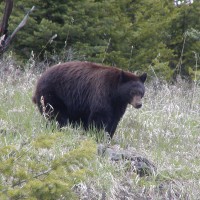 Yellowstone: Birds, Bears & Wildlife FULL - See our fall departures!May 29 - June 4, 2025
Yellowstone: Birds, Bears & Wildlife FULL - See our fall departures!May 29 - June 4, 2025 -
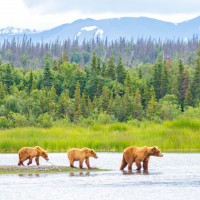 Aleutian Islands Adventure with Dutch Harbor & Kodiak IslandJune 26 - July 6, 2026
Aleutian Islands Adventure with Dutch Harbor & Kodiak IslandJune 26 - July 6, 2026
-
Essential Information +
Pace & Protocols +
Packing List +
Suggested Reading List +
Useful Links +
Photo credits: Banners: Toco Toucan (NJ Stock), Jaguar (Wes Larson), Hummingbird (Wes Larson), Macaws in Flight (Wes Larson), Hyacinth Macaws (Wes Larson), Jabiru & Hyacinth Macaws Flying (Wes Larson) Thumbnails: Jabiru Stork (Wes Larson), Howler Monkey (Wes Larson), Giant River Otter (Wes Larson), Hyacinth Macaw (Wes Larson), Yellow-billed Cardinal (Wes Larson), Jaguar (Wes Larson), Toco Toucan (Peg Abbott), Tiger Heron (Wes Larson)








